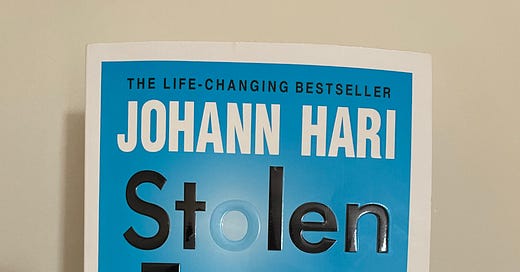What I’ve been reading 📚
Stolen Focus: Why You Can’t Pay Attention by Johann Hari
Not to sound dramatic, but this is possibly one of the most important books of this century. I’ve struggled with writing this review, not necessarily because what is being discussed is particularly complex — when you think about it, it’s actually all very logical — but because nearly every page dropped an eye-opening truth bomb that I found it hard not to quote everything (if you look at my copy of the book, I’ll admit that almost every page has something underlined and a folded down top corner).
By the second chapter, I knew this book would provide me with countless ‘ah-ha!’ moments, as Hari touches upon the very foundation of Femme Factale (see my manifesto here). He states:
‘I came to the realisation that my job in a way is to think something that is different from everyone else — but I was in an environment where I was just getting all the same information as everyone else, and I was just thinking the same things as everyone else.’
The main message of this book is that our attention is being ‘stolen’ from us by twelve deep factors within our environment and current social systems, sparked by Hari’s shock at finding that, by the age of eighteen, his godson had lost nearly all of his childhood spark and curiosity, having become all-consumed by his screens and unable to function normally without them.
In the book, Hari asks key questions related to our digital age, namely how we can gain back control not only of our focus but also our essence as human beings. There is nothing normal in how we live today, with many of us feeling unmotivated, unfulfilled and disconnected from our true selves and each other. Hari brings us hope, arguing that there are ways for us to regain control over our attention, find joy and purpose in the everyday, and unleash our creativity. There is one caveat: we can’t do it in a society fuelled by what he calls ‘surveillance capitalism’ and ‘cruel optimism’, or in other words, one that thinks solely in terms of the ‘individual’, not the community. He believes that the only way to create a better society for all of us is through ‘collective action’.
‘Many of us have built our identities around working to the point of exhaustion. We call this success. In a culture built on ever-increasing speed, slowing down is hard, and most of us will feel guilty about doing it. That’s one reason why it’s important we all do it together — as a societal, structural change.’
As I mentioned, I underlined something on almost every page of the book. However, there were a few aspects Hari touches on that particularly captured my attention (yes, it seems mine hasn’t quite been stolen yet!) The first is the concept of a ‘flow state’, or the ability to focus so deeply on something that everything else is forgotten. This happens to me when I write and read; it’s like the world around me just fades away. I seemed to be one of the only people around me who could tap into this kind of state; now I not only have a name for it, but I also fully understand the importance of it. To reach a ‘flow state’, however, you need to do something meaningful to you. Today, flow states are becoming a rare phenomenon because, to find meaning, you need space and time, of which we are being constantly robbed. This brings me to the second concept I was thrilled to read about: ‘mind-wandering’.
When I was in primary school, I was constantly being told off for daydreaming. I remember one specific episode when I was in Third Grade: my teacher was handing out papers and I was staring out the window lost in thought. She had to call my name at least five times to bring my focus back to the classroom. I felt ashamed and embarrassed, and for a long time, I berated myself for frequently having these ‘episodes’. Now, after reading Hari’s book, or specifically the story he mentions about neuroscientist Marcus Raichle, who had the same experience I had when he was little, I realise that my daydreaming was (and is — I’ve never managed to switch it off) not only normal but purposeful (though I manage to lose an astonishing amount of items due to this habit… mind-wander with caution!). It was the root of my creativity.
‘The kid in class who is staring out the window might be doing the most useful thinking.’
Finally – and this links nicely to my previous point – as a mother, I was particularly interested in the final chapter of the book, which discusses our education system. For a long time, I have felt that our current school system is no longer adequate and – dare I say it – failing our children. Hari argues that it is not only stealing their attention but also depriving them of skills that are necessary for navigating the unexpected (with the threat of AI, is this really something we want our kids to lose?) Interestingly, this is an idea also promoted in the podcast I’ve recommended below. Think about kids today: their days are fully supervised by adults with very little free play and space to find their passions. We fill our kids’s schedules, when, just maybe, what they really need is a daily dose of screen-free boredom to let their minds wander.
‘Children have needs — and it’s our job, as adults, to create an environment that meets those needs. In many cases, in this culture, we aren’t meeting those needs. We don’t let them play freely; we imprison them in their homes, with little to do except interact via screens; and our school system largely deadens and bores them. […] It’s not a flaw in them that, as a result, they are struggling to learn attention. It’s a flaw in the world we built for them.’
In short, I cannot recommend this book enough. Suppose everyone had a copy and we started pressing for the implementation of even just a few of the changes Hari suggests. I’m almost certain we’d find ourselves in a more relaxed and fulfilled society. Change is sometimes slow and never easy, but as Hari emphasises, citing the examples of feminism and gay rights, it is never impossible if we come together: ‘I am free because the people who came before us didn’t give up; they got up. […] no source of power, no set of ideas, is so large it can’t be challenged.’
Has this book piqued your interest? Grab it here.*
What I’ve been listening to 🎙️
Good Inside with Dr. Becky: The Anxious Generation with Jonathan Haidt
This episode of ‘Good Inside with Dr. Becky’ is a must-hear (is that a word?) for all parents and those working with children. My son is quickly approaching the age where phones will come into play and this fills me with angst, so I found this episode particularly insightful. In this episode, renowned clinical psychologist Dr. Becky interviews social psychologist and author Jonathan Haidt, following the publication of his most recent book, The Anxious Generation. Haidt’s book stems from data showing that, in 2013/2014, there was a sudden (unprecedented) rise in mental health issues and depression in tweens and teens. He strongly links this to the emergence of smartphones and social media, in parallel with the decline in free play, referring to this as ‘the great rewiring of childhood’.
I found this argument for play extremely useful, as with my children, I often feel that this is not something prioritised enough at school and in everyday life. I feel sad that we lost this when some of the fondest memories I have of my childhood are ones where I was largely in nature, navigating the terrain on my own. As Haidt says, ‘all mammals play’ and parents are there to give their offspring security to go out in the world and do things. One of the key aspects of play he mentions is the element of risk. Children need to face risks and learn to overcome them on their own because that triggers a sense of competence in their minds or the idea that ‘I can do it’. Rather than focusing on raising our children’s self-esteem, he argues that we should be focusing on raising their sense of competence by teaching them self-efficacy.
Importantly, Haidt traces the issue of risk-averse parenting back to the 80s/90s, when adults began to lose trust in each other. For example, in 1995/1996, more mothers entered the workforce, but that also paradoxically coincided with them spending more time with their children. At that time, the economy also changed; the focus became more on getting kids into top schools, so getting them to compete with one another rather than pushing them to play. Overall, his message is that we, as parents, should spend less time supervising in the real world and more time supervising in the virtual world.
Moreover, according to Haidt, boys are naturally more interested in agency and ‘the mechanics’ (e.g., physical interactions), whereas girls are more interested in the social world and relationships. As such, video games have been tailored to boys, while social platforms have spent a lot of time getting to know what insecurities girls have to keep them scrolling. This is why we see increased levels of bullying and depression (because emotions are spread among girls), which is particularly harmful to girls going through puberty.
So, what can be done? As with all of Dr Becky’s content, it’s not all doom and gloom. There’s always hope. Haidt cites the need to adopt four norms:
No smartphones until high school (if they need to communicate with you, bring back a Millennial fave: the flip phone)
No social media until the age of 16, especially TikTok, Instagram and Snapchat
Push for phone-free schools
Prioritise independence, free play and more responsibility in the real world (if we take phones away, then we need to restore play-based childhoods)
I fully agree with all the above, but I know that I’m in a privileged position (for a short while) whereby my kids are still quite young. I’ve heard from parents of older kids that they were adamant about adopting these norms, but once their kids entered middle school, they became so isolated that the parents gave in. Haidt touches on this, too. He advises that we need ‘collective social action’ (sound familiar?) on this very important issue. One exercise he suggests is The Let Grow Experience, which is homework you can set your child and their peers requiring them to regularly take on new challenges on their own. In short, his message is clear: if we remove our kids’s phones, then we need to fill their days with more free play and a certain level of risk. Worth a try? I think so.
Listen to the full podcast here.
If you’re interested in learning more about Jonathan Haidt’s ideas, I strongly recommend ordering his book, The Anxious Generation, available here.*
*All books are affiliate links.
Bonus: What I’ve been watching 🍿
Recently, I’ve been loving AppleTV+ productions (FYI this is not an ad). I’ve especially gotten into two series: Palm Royale and Loot (the latter’s actually already on its second season — I was a bit late to the game). Both shows are vivid in colour and a pure joy to watch. With Palm Royale, I’m whisked back to my favourite decade: the Swinging Sixties; and with Loot, I’m reminded of the importance of friendship groups. Both have given me major outfit envy — if I had a wardrobe full of Molly’s (the main character in Loot) pyjamas, I don’t think I’d ever get dressed! If you’re looking for something fun to watch, I recommend giving both series a try.






